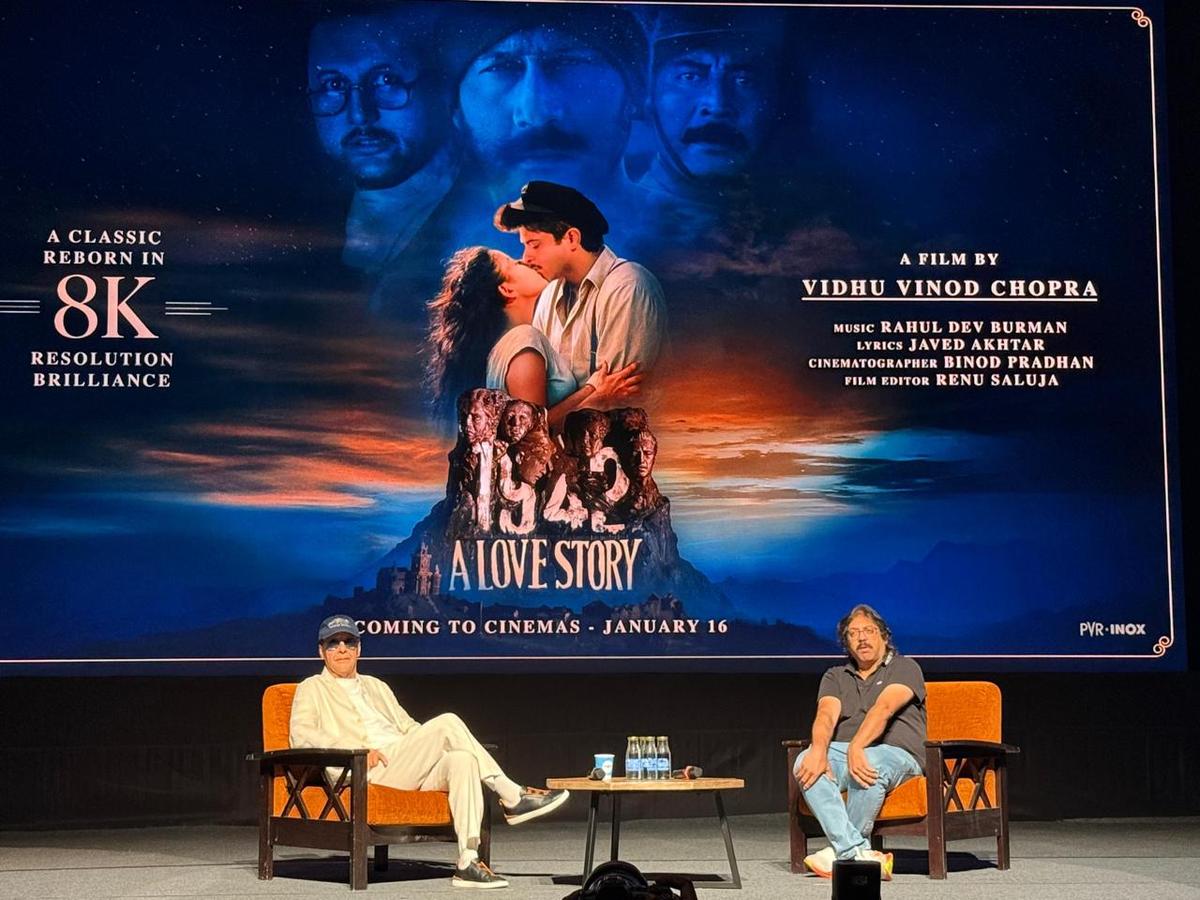At the 56th International Film Festival of India on Saturday, veteran filmmaker Vidhu Vinod Chopra used his on-stage In Conversation session with screenwriter Abhijat Joshi, to lay out a series of memories from his early career and the making of 1942: A Love Story, keeping the focus on the practicalities that have shaped his work over his 45 year-old cinematic history. Later in the session, his 97-year-old mother-in-law and 1942 dialogue writer, Kamna Chandra, joined him on stage, along with producer-restorationist Yogesh Ishwar, who supervised the film’s 8K restoration in Italy.
Among the highlights, Joshi reminisced over Chopra’s early years at the Film and Television Institute of India. Chopra recalled the time he won a National Award for his student film Murder at Monkey Hill. “I thought I’d get ₹4,000,” he said. “Instead they gave me an eight-year postal bond.” He described confronting the then Information and Broadcasting Minister L.K. Advani about it. “I told him, ‘Why would you do this to a student?’ He said it would mature later. I said, ‘Sir, I need the money now,’” which cracked the audience up.

Chopra said he was asked to come to Shastri Bhavan the next day, where Advani admonished him for his on-stage behaviour, told him to “call your father” and pushed the phone toward him. Chopra explained how the minister grew irritated as he questioned him in the office’s long corridors and large government rooms. Cornered, he deflected by abruptly asking, “Sir, aapne breakfast kiya hai? (Did you have breakfast?)”. The unexpected question broke the tension, leading Advani to order him eggs and parathas before sending him to Gol Dak Khana, where he finally received the ₹4,000.
The discussion moved into the period when Chopra’s An Encounter with Faces was nominated for the Academy Award for Documentary Short Subject. He approached Advani again, who arranged the trip. “He got me a three-month passport, without police verification, gave me twenty dollars a day to stay there. and an Air India ticket, free,” Chopra says, adding how grateful he was for the support on such short notice.

Vidhu Vinod Chopra during the In Conversation session at IFFI 2025.
| Photo Credit:
SPECIAL ARRANGEMENT
After meeting Advani, Chopra went to the U.S. Embassy on very short notice, but the visa officer questioned whether he was really Oscar-nominated and a particularly obstinate English-speaking Indian guard turned him away. He pulled out newspaper clippings to prove it, before they granted him a single-entry visa for three months.
Chopra also spoke about sitting beside Jane Fonda during the Oscar ceremony, in what he describes as his “night suit”, and impressing seasoned auteur Francis Ford Coppola to the point of even landing a job offer at The Godfather filmmaker’s American Zoetrope production company.
Chopra and Joshi then shifted to 1942: A Love Story, which screened at IFFI this year in an 8K restoration. Much of the session detailed the practical challenges behind the original shoot. Chopra explained that he insisted on real birds flying through a key mountain shot. “Everyone said it wouldn’t happen,” he said. “My assistants, including (now acclaimed filmmaker) Rajkumar Hirani, went up the night before and scattered breadcrumbs to attract the birds.”
He also described the pressure of finishing the film after the death of R.D. Burman, whose score became one of the last major works of his career. He recalled rejecting Burman’s first attempt at the tune. “I told Pancham, ‘This is not shit, this is bullshit,’” he said. Burman went back, worked on the melody again, and returned with a revised version. Chopra remembered the turning point clearly: “When I heard the new tune, I said, ‘This is it.’”
Chopra called the film “very close” to him and spoke briefly about revisiting it decades later. “To see it like this today is emotional,” he said. He noted that the restoration allowed audiences “to hear the music the way it was meant to be heard.”
ALSO READ: I have a Munnabhai in me: Vidhu Vinod Chopra
The session also briefly touched on the years leading up to Parinda. Chopra spoke about writing Khamosh in a one-room flat in Mumbai and rehearsing lines on the terrace late at night. Neighbours, he said, believed something suspicious was happening upstairs because they often heard him yelling “cut!” in the middle of the night. Actor Jackie Shroff, who lived nearby at the time, once walked into Chopra’s house reciting his lines back to him while he was rehearsing because he could hear every line “from a hundred metres away.”
Throughout the hour, Joshi steered the conversation toward the constant shifts in Chopra’s working style across decades. Chopra said the craft changed, the infrastructure changed, and the industry changed, but the basic work ethic remained the same. “There is only one rule — you do the work honestly,” he said. “The most important thing for filmmakers is to really make movies you believe in, and sooner or later the world will come to you.”
Published – November 22, 2025 07:03 pm IST
